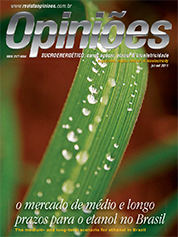Carlos Eduardo de Siqueira Cavalcanti
Head of BNDES’ Biofuels Department
Op-AA-29
An agenda of challenges and opportunities
While still unable to state that all effects of the 2008 crisis have been duly overcome, the sugarcane-based energy industry is timidly attempting to resume growth. In the Center-Southern region, responsible for more than 90% of domestic production, crushing in the last 3 years progressed at an annual pace of 3%, quite modest when compared to the annual 10% of the period 2003-08, and insufficient to generate additional ethanol production to comfortably meet the “Chinese” growth rate of the country’s flex-fuel vehicle fleet.
The assessment of the most recent project consultations and approvals relative to Bndes’ portfolio shows that there is a trend towards investment amounts that exceed the historical average as related to energy co-generation, a fact that can be explained by companies’ search for more stable revenues in this post-crisis period.
Another aspect is that long-term energy sales contracts, normally handled in the regulated market, end up comprising a substantial share of the guarantees that will make new financing feasible. Analyzed from the perspective of the Bank’s disbursements to the industry, the year 2010 was quite exceptional, with total disbursements reaching a record R$ 7.6 billion, again showing this industry’s responsive capacity.
Decisive contributions to this performance were Bndes’ “PSI” credit lines, maintained under the Capital Goods Investment Sustainability Program, with competitive conditions throughout the year, which allowed for investments in the modernization of industry and agriculture.
When looking ahead rather than in the rear mirror as concerning what is a typical initiative of a development bank, we may state that Bndes’ agenda for this industry in coming years is defined by some fundamental elements, which are:
1. the need to expand production capacity, particularly of ethanol;
2. support for logistics systems that adequately allow production to reach consumer regions;
3. strengthening the equipment supplier chain; and
4. supporting technological innovation. The first topic, related to investing in the expansion of industrial capacity, has been and will continue to be the flagship of our activities, in light of the need to guarantee adequate supply of fuel for the flex-fuel vehicle fleet, which is sustaining its growth rate.
Although it is still unclear when investments will resume, particularly greenfield projects, two factors may contribute to a faster corporate decision-making process:
1. the exhaustion of the post-crisis acquisition cycle, in which change in ownership occurred in a magnitude of more than 150 million tons (or 25% of the total crushing capacity); and
2. the debate concerning the U.S. tax package (the VEETC - Volumetric Ethanol Excise Tax Credit), a set of tariffs and subsidies that favors ethanol from corn produced in that country, to the detriment of Brazilian ethanol, which tax credit is expected to be dropped.
As concerning support for logistics, in addition to financing some initiatives of companies in the industry aimed at the development of transportation systems in the waterway and railroad modals, and for the betterment of port infrastructure, the Bank is financing a company named Logum, which is implementing a pipeline for ethanol, with the first phase currently in progress.
This is an emblematic project for Brazil, because apart from allowing getting ethanol to the main consumer regions at competitive costs, it will reduce carbon emissions by causing the idling of a significant fleet of heavy diesel-burning vehicles.
With respect to the customized capital goods industry, historically supported by Bndes, there is a clear perception that companies, like the mills, came out of the crisis in a very fragile state.
However, unlike the mills, that to a large extent consolidated and changed owners and were subsequently capitalized, other companies in the industry remained in a delicate situation, so it is very important that they seek to reorganize before possibly resuming investments in the sugarcane-based energy industry.
One should emphasize that of Bndes’ total disbursements to this industry last year, about R$ 4 billion were invested under the “PSI” (Capital Goods program).
Finally, one should emphasize Bndes’ initiative in supporting efforts made to foster innovation. Together with Finep, in March of this year, we launched a Joint Plan for the Support of Industrial Technological Innovation in the sugarcane-based energy and sugarcane-based chemical industries – named “PAISS”, that has been endowed with funds in the amount of R$ 1 billion, and, based on new industrial technologies destined for the processing of biomass derived from sugarcane, focuses on three objectives: second generation ethanol, new products derived from sugarcane following bio-technological routes, and the thermo-chemical gasification route.
Many of these new technologies are expected to reach competitive scale in the current decade. Bndes has been proactively engaged in assisting the sugarcane-based energy industry, having done so in an emphatic way in the context of the 2008 crisis, ratifying its long-term commitment and vision. By performing in a way such as to overcome the above mentioned challenges, I believe we will contribute to the strengthening of this so virtuous and strategic industry for the country.




